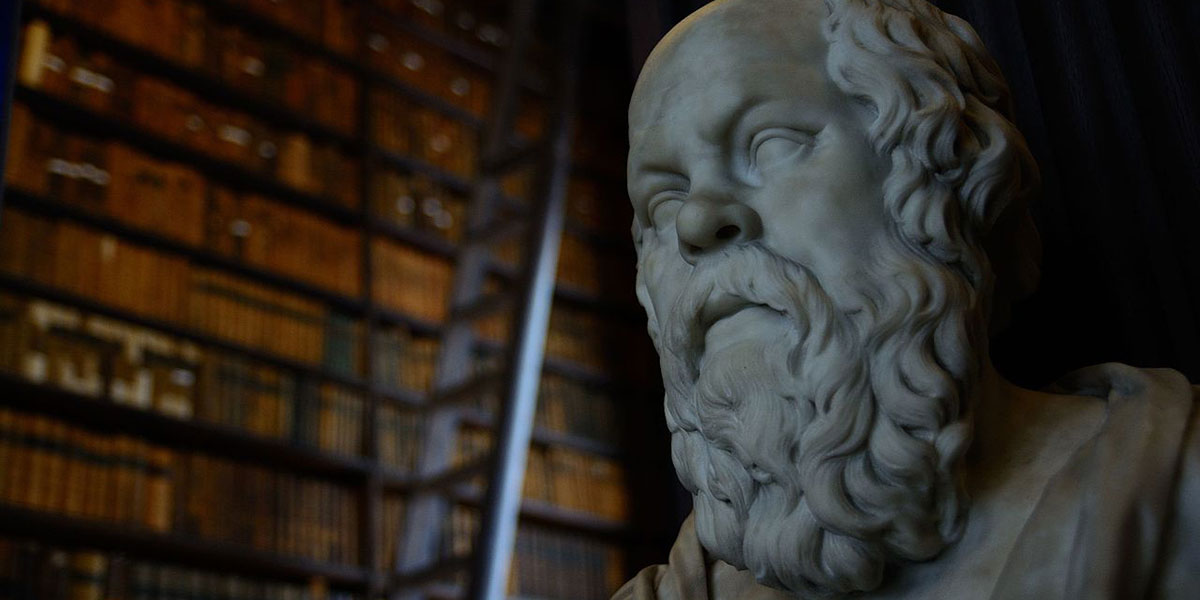Philosophy & Religion

Philosophy, from the Greek philos ("loving") and sophia ("wisdom"), is a bit hard to define. Merriam-Webster alone defines Philosophy as "all learning exclusive of technical precepts and practical arts," "a discipline comprising as its core logic, aesthetics, ethics, metaphysics, and epistemology," and "a search for a general understanding of values and reality by chiefly speculative rather than observational means."
For our own part, we like to boil it down that philosophy is the study of what stuff is, how he know, and what we should do about it. Prominent philosophers through history have taken stabs at all three of those basic categories. Religion, from the Latin religare ("to bind [together]"), is in that way similar to philosophy, and the two tend to overlap quite often. Many of our philosophical beliefs are influenced by our religious beliefs, and vice versa.
Here at Infoplease, we've gathered some of history's most influential religious and philosophical texts for you to study. If you like what you read, you can discover more about philosophy and religion in our encyclopedia. If you're ready to take a deep dive into academic philosophy, you can also check out the in-depth (if more technical) content at the wonderful Stanford Encyclopedia of Philosophy.
The Art of War
The Art of War, credited to Sunzi, is a famous work from Classical China describing the practice and philosophy of warfare. Although there's some dispute as to when exactly it was written, it comes from a time when the imperial authority of the Western Zhou dynasty had declined, and there was bitter fighting throughout China. The Art of War is widely cited both in the context of military conflict and personal conflict, and many find its wisdom broadly applicable to the challenges of everyday life.
The Bible
The Bible needs no introduction, but it'll get one anyway. The Bible, from the Greek ta biblia ("the books"), is the collected holy books of the Christian faith, with notable variations between Catholic, Orthodox, and Protestant bibles. It is famously divided in two parts; the first is a translated and in some ways altered version of the Jewish Tanakh, and the second is a later account of the lives of Jesus Christ and his disciples. The Bible is the most translated text in the world, and a key factor in the history of Western civilization for the past two thousand years.
The Meditations of Marcus Aurelius
Marcus Aurelius, the emperor of Rome who succeeded Antoninus Pius, is widely revered as a philosopher-king of good moral judgement and even temperament. Whether or not you prescribe to that image, it is true that Aurelius was a widely read student of Stoic philosophy, and he left behind him one of the most influential books of philosophy ever put to pen. Written on the campaign trail, the Meditations are Aurelius's thoughts on life and leadership, which are cited by world leaders to this day.
Tao Te Ching
The Dàodéjīng (better known in the West by its older Wade-Giles title, the Tao Te Ching) is one of the great classics of Chinese literature, and an important spiritual text for Daoists. The book was most likely written around 2400 years ago; the popular account ascribes the book to the legendary sage Laozi, but historians may never definitively prove his identity or existence. Since its writing, it has influenced untold generations of artists and intellectuals in China and around the world.
The Quran
Tradition holds that the teachings of the Quran were revealed to the prophet Muhammad from 609 CE to 632 CE, and that shortly after his death his companions compiled his words into the Muslim holy book. Early dated copies of the Quran roughly support this timeline. The Quran isn't terribly long, and it often assumes familiarity with the Bible, with which it shares many common stories. The book itself is considered a masterpiece of Arabic literature, and it has had a profound influence on the art and poetry of the Middle East in both subject and form.
The Upanishads
The Upanishads are the part of the Vedas, the collected Sanskrit writings that form the ancient foundation of spiritual belief and practice in India. The Upanishads are specifically the portion of the Vedas concerned with meditation, philosophy, and spiritual learning, as opposed to other parts that detail more ritual or ceremonial beliefs. The earliest twelve, collected here, are considered the most essential. There are, however, over 200 Upanishads composed since the first ones were recorded roughly 2,600 years ago.







